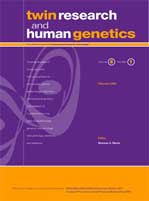Twin Research and Human Genetics
Twin Research and Human Genetics is a field of study that focuses on the genetic and environmental influences on human traits, behaviors, and diseases by studying twins. Twins, both identical (monozygotic) and fraternal (dizygotic), provide a unique natural experiment that allows researchers to disentangle the genetic and environmental components of various characteristics. This field encompasses a broad range of disciplines, including genetics, epidemiology, psychology, and molecular biology.
Overview[edit | edit source]
Twin studies have been a pivotal part of genetic research for decades. They rely on the comparison between monozygotic twins, who share 100% of their genes, and dizygotic twins, who share on average 50% of their segregating genes, similar to non-twin siblings. By comparing the similarities and differences in traits and diseases between these two types of twins, researchers can estimate the heritability of traits—the proportion of variation in a trait that can be attributed to genetic factors—and the influence of environmental factors shared and not shared by twins.
Methodologies[edit | edit source]
The methodologies used in twin research include quantitative genetics, which involves statistical methods to estimate the genetic and environmental contributions to trait variance; molecular genetics, which looks at specific genes and their effects; and epidemiology, which studies the distribution and determinants of health and diseases in populations. Twin registries, large databases of twins who have agreed to participate in research, are crucial resources for this field.
Applications[edit | edit source]
Twin research has contributed significantly to our understanding of a wide range of human traits and conditions, such as intelligence, personality, mental health disorders (e.g., schizophrenia, bipolar disorder), obesity, and heart disease. It has also been instrumental in the study of aging and developmental psychology.
Ethical Considerations[edit | edit source]
While twin research has provided invaluable insights into the nature of human health and behavior, it also raises ethical considerations. Issues such as privacy, consent, and the potential for genetic discrimination are of concern. Researchers must navigate these ethical challenges carefully, ensuring that their studies are conducted with the utmost respect for the rights and welfare of twin participants.
Notable Twin Studies[edit | edit source]
Some of the most well-known twin studies include the Minnesota Twin Family Study, which has significantly advanced our understanding of the genetic and environmental influences on psychological traits, and the Swedish Twin Registry, one of the largest twin registries in the world, which has contributed to a wide range of medical and psychological research.
Future Directions[edit | edit source]
The future of twin research and human genetics is likely to be shaped by advances in genomic technology, such as whole-genome sequencing, which will allow for more detailed and comprehensive analyses of the genetic contributions to complex traits and diseases. Additionally, there is a growing interest in integrating genetic data with information from other biological levels, such as the epigenome, transcriptome, and microbiome, to build a more complete picture of the biological basis of human health and disease.
| Twin Research and Human Genetics Resources | |
|---|---|
|
|
Search WikiMD
Ad.Tired of being Overweight? Try W8MD's physician weight loss program.
Semaglutide (Ozempic / Wegovy and Tirzepatide (Mounjaro / Zepbound) available.
Advertise on WikiMD
|
WikiMD's Wellness Encyclopedia |
| Let Food Be Thy Medicine Medicine Thy Food - Hippocrates |
Translate this page: - East Asian
中文,
日本,
한국어,
South Asian
हिन्दी,
தமிழ்,
తెలుగు,
Urdu,
ಕನ್ನಡ,
Southeast Asian
Indonesian,
Vietnamese,
Thai,
မြန်မာဘာသာ,
বাংলা
European
español,
Deutsch,
français,
Greek,
português do Brasil,
polski,
română,
русский,
Nederlands,
norsk,
svenska,
suomi,
Italian
Middle Eastern & African
عربى,
Turkish,
Persian,
Hebrew,
Afrikaans,
isiZulu,
Kiswahili,
Other
Bulgarian,
Hungarian,
Czech,
Swedish,
മലയാളം,
मराठी,
ਪੰਜਾਬੀ,
ગુજરાતી,
Portuguese,
Ukrainian
Medical Disclaimer: WikiMD is not a substitute for professional medical advice. The information on WikiMD is provided as an information resource only, may be incorrect, outdated or misleading, and is not to be used or relied on for any diagnostic or treatment purposes. Please consult your health care provider before making any healthcare decisions or for guidance about a specific medical condition. WikiMD expressly disclaims responsibility, and shall have no liability, for any damages, loss, injury, or liability whatsoever suffered as a result of your reliance on the information contained in this site. By visiting this site you agree to the foregoing terms and conditions, which may from time to time be changed or supplemented by WikiMD. If you do not agree to the foregoing terms and conditions, you should not enter or use this site. See full disclaimer.
Credits:Most images are courtesy of Wikimedia commons, and templates Wikipedia, licensed under CC BY SA or similar.
Contributors: Prab R. Tumpati, MD

